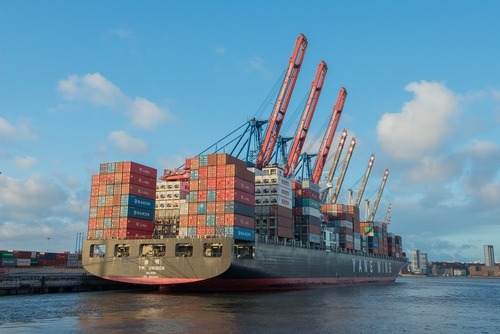Inflation et pénurie de conteneurs
Alors que l’économie de la Chine, qui utilise à elle seule la moitié des matières premières dans le monde, est en plein redémarrage, les cours des matériaux de base s’envolent. Une flambée des coûts qui ne facilite pas la tâche des entreprises européennes, qui doivent déjà faire face aux nombreuses complications engendrées par la pandémie.
Le pétrole est remonté à 60 dollars au début du mois de février 2021, après avoir chuté à moins de 20 dollars en avril 2020. L’acier s’est envolé le premier, dès le mois de décembre 2020, suivi du cuivre, dont le prix a augmenté de 27,9 % en un an. La tonne de cuivre se vend désormais 8500 dollars, un niveau jamais atteint depuis 2012.
Le cours de l’aluminium est au plus haut depuis 2018, le nickel tout proche de battre un record inégalé depuis 7 ans, et le minerai de fer a également augmenté.
Par ailleurs, certains matériaux viennent à manquer, comme le bois de construction, ou encore les composants électroniques, ces derniers mettant l’industrie automobile en mauvaise posture. En raison d’un manque de puces, la construction d’un million de voitures ne pourra pas être achevée au premier trimestre.
Quant au transport, il est fortement impacté par la pénurie de conteneurs, qui s’explique notamment par le rebond de l’économie mondiale. Conséquence : les prix s’envolent, et les délais de livraison augmentent.
Des sources d’inquiétude en interne
Ces facteurs externes viennent s’ajouter à une situation interne déjà complexe pour nombre d’entreprises.
Les prêts garantis par l’État (PGE), qui ont permis de gagner un peu de temps, vont un jour ou l’autre devoir être remboursés, ce qui ne sera pas une tâche aisée. Début février, 650 000 entreprises avaient bénéficié d’un PGE, pour un montant total de 130 milliards d’euros.
Les équipes subissent quant à elles les baisses de salaire liées au chômage partiel et / ou à la diminution des primes, et doivent composer avec le télétravail, fortement recommandé depuis 4 mois par le gouvernement.
La généralisation du télétravail entraîne également une réflexion autour de la réduction des surfaces de bureaux. Si une telle décision est avantageuse pour l’entreprise qui voit diminuer le montant du loyer, elle peut être source de stress pour les employés, qui ne vivent pas tous bien le fait de devoir travailler depuis leur domicile.
Enfin, le risque cyber est de plus en plus important pour les entreprises. Ainsi, lundi 15 février, un rapport de l’Agence nationale de la sécurité des systèmes d’information (Anssi) a révélé que plusieurs intrusions informatiques avaient eu lieu entre 2017 et 2020 sur le logiciel Centreon, utilisé par de nombreuses grandes entreprises françaises et par le ministère de la Justice.
